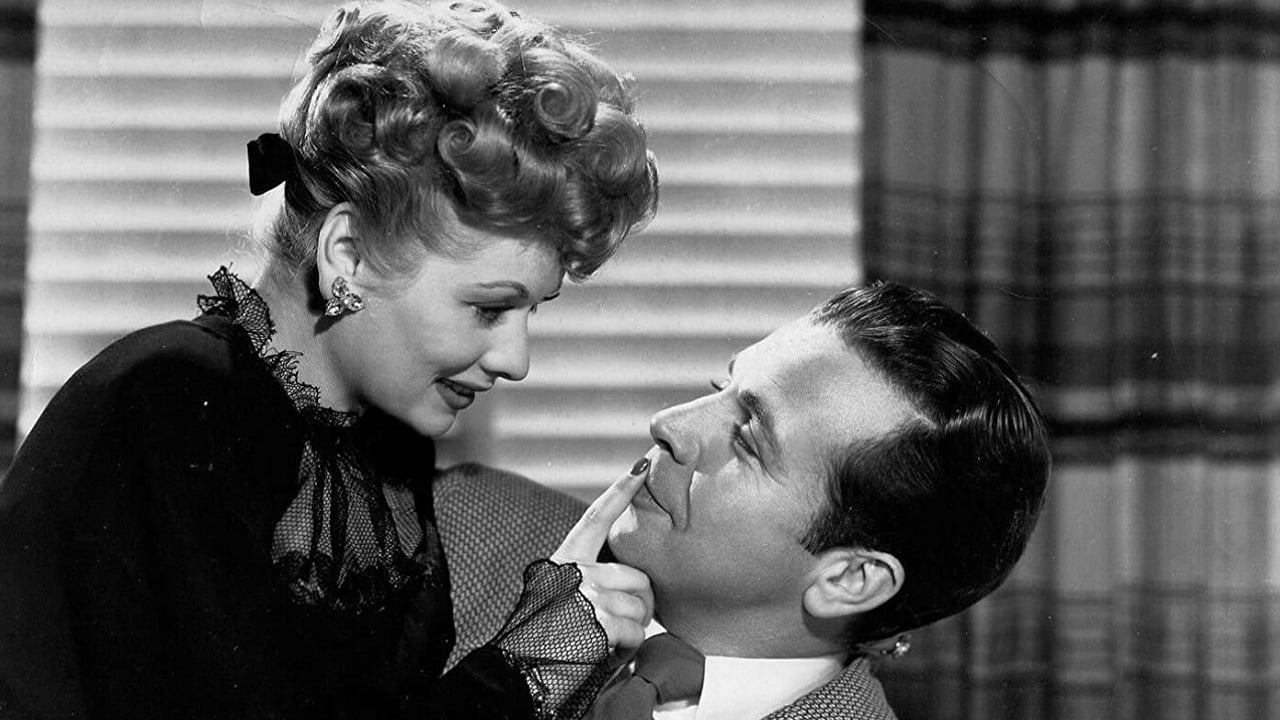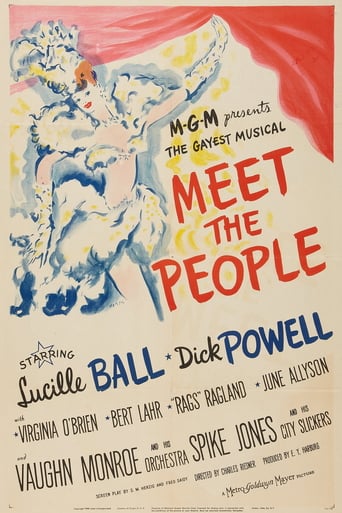Sienna-Rose Mclaughlin
The movie really just wants to entertain people.
Kamila Bell
This is a coming of age storyline that you've seen in one form or another for decades. It takes a truly unique voice to make yet another one worth watching.
Cody
One of the best movies of the year! Incredible from the beginning to the end.
Skyler
Great movie. Not sure what people expected but I found it highly entertaining.
jbacks3
Personally I think several of the opinions here are awfully harsh and take unfair advantage of 20/20 hindsight. Yes, WW2 was horrible--- and you've got innumerable references to topical characters that've faded from the average person's knowledge. But a Ken Burns documentary this ain't! Valid criticism: it suffers from being an MGM musical shot in black & white with a 40-year old Dick Powell who'd had his more than his fill of such stuff. But there's a lot it on the plus side too: Virginia "The Shynx" O'Brian is terrific, June Allyson (possibly where she first met Dick?), Bert Lahr doing some of his finest signature work (it left me wondering why he was never in the running for the Fred Mertz role--- the cast seemed to love him) and honestly, Lucille Ball looks amazing, dubbed voice and all. And there's also the seemingly incongruent mix of Spike Jones and Vaughan Monroe. The stage version was already several years old and several of the (admittedly unremarkable) songs were updated for the war effort. Look for MGM-contract star Mickey Rooney's dad, Joe Yule, in the role of "Shorty," Bobby Blake doing his best to remain on the Metro lot during the waning days of Our Gang and Rags Ragland, less than two years away from his very premature death. This is an entertaining, very loose stage adaption of a modest Broadway hit geared to wartime audiences just wanting to be entertained. Far from a classic but worth watching.
jotix100
For having been made at MGM, "Meet the People", didn't get the usual treatment by the studio. The film was shot in black and white and there are no lavish production numbers. The movie was based on a musical revue that played in Los Angeles during WWII. It has its share of propaganda, since most of the action takes place around a navy yard where war ships were constructed.The best thing in the film are some of the songs that were composed for it. The best song heard on the film is "I Like to Recognize the Tune", composed by Richard Rogers and Laurenz Hart. The other great number is one in which Spike Jones and his City Slickers appear dressed as Mussolini, Hitler, and figures on the wrong side of the war, as they sing a parody of a sextet of "Lucia di Lamermoor".Lucille Ball plays Julie Hampton. She was at the height of her good looks and cut a lovely figure. Her love interest is played by Dick Powell, an actor with a lovely manly voice who was also at a good point of his career. Bert Lahr, Virginia O'Brien and a young June Allyson, soon to be Mrs. Dick Powell, appear in supporting roles.The film was directed by Charles Reisner and the black and white cinematography was by Robert Surtees that has kept its crispness in spite of having been shot more than sixty years ago. The film would be a curiosity piece by fans of Lucille Ball.
tedg
The movies I choose to watch are sometimes suggested by events. Recently. I encountered yet another incomprehensible act by the American War Department and took refuge in this.It is from an era of justified involvement in a war. Death camps, master race.It is rank propaganda, subsidized by political leaders. It has other offenses. Blacks are shown twice: a man as a yassa porter and women happily picking cotton.And yet its charm is in the thing it celebrates. You likely will never see this. It is dated and not very good as a film. The strings it pulls... well, they're broken. So let me describe it.It features Lucille Ball before she made herself a joke. In this era, she was a desirable pinup, even at 33. She parades her legs and glamor as a famous stage actress. She meets and falls in love with a wartime shipworker who aspires to be a playwright. He, it turns out, has written a play featuring the good souls of the shipyard representing all the "ordinary people" of America who labored for the war effort, which at root was a competition of manufacturing infrastructures.That play is the device around which all sorts of narrative effects are folded. There's the bit which forms the plot: she likes the play and attempts to put it on. But it gets too glamorized for the author. It isn't "real" enough and rather than demean the subject, he forgoes wealth and fame and closes it down. She follows him back to work in the shipyard to charm him into letting the show go on. As scripted, she discovers and comes to appreciate the goodness of the honestly laboring people.At the end, she puts on the play as he intended it to be, at the shipyard. Inside the play's performance, he literally enters the play and reconciles with our girl. End of story.Along the way, there are an amazing number of other excuses pulled to have song and dance numbers. Its purpose, after all was to mix entertainment and "the message."So you have:—lunchtime shows at the shipyard (with Spike Jones and Hitler played by a chimp). Also, an evening show with several elaborate numbers.—a love song when the two go on their first date, the song half him demonstrating the song to her and half wooing her in the story by song.—a bit as if the movie were a musical comedy. In this case, the story itself bends into comic song as Burt Lahr's character christens his boat.—imitations of famous war leaders, performed randomly whenever a certain character appears. Some of these are unrecognizable today.And that's in addition to seeing bits of the title show in New York and the shipyard.A lot of entertainment. All the shows, every one, are miniature versions of the larger movie: celebrations of ordinary folk and then American values.Ted's Evaluation -- 2 of 3: Has some interesting elements.
mmhorvat
I went into this movie hoping for the best. I like wartime musicals in general. Dick Powell and Lucille Ball did good jobs with their roles; however, the writers gave them boring dialog. The love-interest between the two of them was not given any real growth; just suddenly it was there. I did not think much of the music; the best number was the snippet we heard of Spike Jones with "Der Fuhrer's Face." The one complete number that Spike Jones did had little of his great musical comedy; pretty tame stuff,even with the monkey. Bert Lahr's comedy skits were interminable.There were parts to enjoy: Lucille Ball was quite a looker, and there was a good selection of bit players who really deserved more time on screen.

